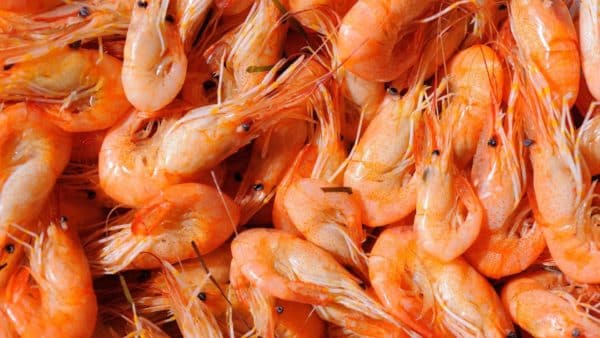

One billion pounds of shrimp are eaten by Americans every year – that’s a lot of shrimp! But should we be sharing some of these tasty shellfish with our dog?
As a general rule, it is okay for dogs to eat shrimp; in fact, they may even offer some health benefits, but it is important to be mindful of where your shrimp comes from and how you go about feeding them to your dog.

While shrimp are not toxic to dogs, there are a few rules to follow, the most important of which is to thoroughly cook shrimp first before feeding them to your dog. Raw shrimp can be a source of many harmful bacteria such as salmonella and listeria, which can cause food poisoning if they infect your dog.
Salmonellosis leads to a variety of symptoms that, if left untreated, can be fatal. Symptoms to look out for include fever, lethargy, vomiting, diarrhea, and shock. If you think your dog may have food poisoning, take them to your nearest vet immediately as they will likely require fluid therapy and other supportive treatment.
In addition to these bacterial diseases, raw shrimp carries the risk of parasites such as tapeworms and roundworms. However, you should always stay on top of your dog’s anti-parasite treatment regardless.

The shell and tail of a shrimp also pose a risk to our canine friends. These parts of the shrimp are very hard and difficult to digest, and so can become blocked in your dog’s gastrointestinal system which, in severe cases, may require surgery to remove.
Is your pet safe?
1 in 3 pets will need emergency veterinary treatment each year and it is estimated a pet receives emergency care every 2.5 seconds in the U.S.
The average cost of treating a broken bone in dogs is $2,700. Cancer treatments? Up to $10,000.
It’s why so many pet owners say their biggest regret isn’t the vet bill—it’s not having pet insurance when they needed it most.
Ask yourself: “If an unexpected $5,000 vet bill hit tomorrow, could I afford it?”
If the answer is no, it’s time to get covered.
Take a look at Lemonade. They have a great app that actually works, they have an instant chatbot that is faster and, dare we say it, friendlier than most companies’ “real” customer service and a quick scroll through Reddit will uncover… people are really vibing with this brand.
So go check them out and take a look. It takes less than a minute.
They can also be a choking hazard if your dog is not able to swallow them whole. Shrimp tails and shells tend to have very sharp and pointed edges which have the potential to perforate your dog’s intestinal wall, leading to a very nasty infection of the abdominal space called septic peritonitis.
This is a serious and potentially life-threatening condition, so be vigilant when preparing shrimp for your dog to eat.
The flesh of shrimp is also high in dietary fat, which should be fed in moderation to your dog. A high-fat diet can contribute to unwanted weight gain and obesity.
Furthermore, if your dog has been diagnosed with pancreatitis in the past, the excessive fat might prove too difficult to digest, leading to a flare-up of this condition. If this sounds like your dog, avoid shrimp altogether.
Always source your shrimp from a high-quality and trusted supplier as intensively farmed shrimp could be full of antibiotics, disinfectants, and pesticides, all of which can be harmful in large quantities.
It’s also important to note that, much like us, some dogs may have a genuine allergy to shrimp meat. Symptoms of an allergic reaction can range from diarrhea to itchy skin and even anaphylaxis. If your dog reacts in this way, contact your vet immediately.
However, all of this does not necessarily mean you should avoid feeding shrimp to your dog altogether as this seafood can have many health benefits which I will cover shortly. Just be sure to remove the hard shells and tails, and to properly cook the shrimp through.
If your dog is generally an allergic or sensitive dog, this allergy medicine for dogs contains a powerhouse of natural ingredients and may help provide relief from other seasonal and environmental allergens.
Revitalize your dog’s appetite with our top products for boosting hunger and encouraging a hearty appetite. We’ve compiled a selection of delectable and nutritious food toppers, enticing treats, and appetite-stimulating supplements that will have your canine companion eagerly anticipating mealtime.
Shrimp are packed full of vitamins, minerals, and antioxidants that are vital for keeping your dog healthy. These include vitamin B12, phosphorus, iron, niacin, and others.
Vitamin B12 (cobalamin) plays an important role in supporting nerve and brain function, as well as the production of blood cells. Vitamin B12 is also important for your dog’s digestive system, ensuring that nutrients are absorbed properly in the intestine.
Phosphorus is vital for proper kidney function and is a major component of bone and cartilage and Iron is vital in allowing your dog’s red blood cells to properly transport oxygen around the body. A lack of iron leads to anemia and is life-threatening.
Shrimp is also a good source of glucosamine, a compound that aids joint health by repairing cartilage. This is particularly important as your dog ages. These hip and joint chews are a premium supplement that helps keep your dog’s joints healthy!
Finally Niacin, also referred to as vitamin B3, is vital for the proper digestion of fats. It allows your dog to use fats as an energy source and to maintain healthy skin.

So as you can see, shrimp can have a whole host of benefits but I wouldn’t make shrimp the main component of your dog’s diet, instead just use it as an occasional treat. Too much shrimp can result in too much fat and cholesterol in the diet. I’d recommend sticking to no more than 50-100g cooked shrimp per week.
It’s extremely important to make sure your dog is getting the micronutrients they need to be healthy. These supplements for dogs contain ALL the nutritional vitamins, minerals, antioxidants, and essential omega-3 fatty acids that will help your puppy or senior dog stay healthy, happy, and in great tail-wagging condition!
Most of us train our dogs when they are puppies to jump up on furniture. We think it’s harmless (and easier than always lifting them), but for dogs, couches and beds are very high compared to the size of their bodies.
Every time they jump it compresses their back and applies enormous force to their joints.
It’s no wonder that an incredible 80% of dogs experience arthritis or joint pain by only 7 years old.
Luckily, there is a vet-recommended solution.
It’s the PawRamp by Alpha Paw. An adjustable ramp that allows dogs to safely get on and off couches and beds. PawRamp makes joining you in bed or on the couch effortless and fun.
As a bonus, you can use code SAVE35 to get $35 off the PawRamp today.

The medical, nutritional, or behavioral advice we provide is intended for informational and educational purposes only. Our editorial content is not a substitute for formal or personalized medical advice from a veterinary professional. Only board-certified veterinary specialists who have examined your pet should diagnose medical conditions, provide personalized treatment, or prescribe appropriate medication. For questions regarding your pet’s health, or if your pet is exhibiting signs of illness, injury, or distress, contact your veterinarian immediately. Never disregard professional medical advice or delay in seeking it because of something you have read on our site.